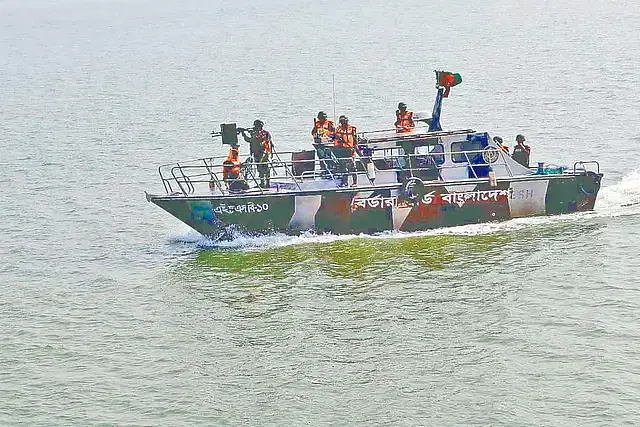
After 11 months of fighting, the Arakan Army (AA) has taken control of the Maungdaw township in Myanmar’s Rakhine State. On Sunday afternoon, they also captured the last of the Border Guard Police (BGP) battalions south of Maungdaw.
With Maungdaw now under Arakan Army control, the security risk for Rohingyas on both sides of the Bangladesh-Myanmar border has increased. Approximately 500,000 Rohingyas remain in Rakhine state, where tensions with the Arakan Army persist.
This situation may force more Rohingyas into Bangladesh. As a result, the Bangladesh Coast Guard and Border Guard Bangladesh (BGB) have intensified patrol along the borders of Bandarban and Cox’s Bazar.
Immediately after capturing Maungdaw, the Arakan Army imposed a ban on navigation on the Naf River. This halted the operation of passenger trawlers and speedboats on the Teknaf-St. Martin waterway in Bangladesh.
Tourists now travel to St. Martin’s Island via the BIWTA jetty in Nuniyachhara, Cox’s Bazar. Local representatives report that food reserves on St. Martin’s Island have decreased due to the five-day ban on navigation. Additionally, cargo ships from Myanmar are unable to enter Bangladesh through the Teknaf land port.
Bangladesh shares a 270 km border with Maungdaw in Myanmar, divided by the Naf River. The river stretches from Naikkhongchhari in Bandarban to Ukhia in Cox’s Bazar and St. Martin’s Island in Teknaf, opposite Rakhine State.
To prevent further Rohingya infiltration, Bangladesh has strengthened security along this 270-kilometer stretch from St. Martin to Naikhangchhari via Teknaf and Ukhia.
Border security heightened
Several sources along the border report that since the Arakan Army took control of Maungdaw, a ceasefire has been in place. The frequent mortar shelling and grenade explosions have ceased. Although the situation appears relatively calm, a sense of unease lingers on both sides of the border—Teknaf in Bangladesh and Maungdaw in Myanmar. More than 23 villages on the Teknaf border were shaken by loud explosions from across the border. Occasionally, stray bullets have struck homes in Teknaf.
On Thursday morning, Border Guard Bangladesh (BGB) and Coast Guard patrols were observed in the Naf River near the Teknaf, Sabrang, and Shah Parir Dwip border areas.
Refugee Relief and Repatriation Commissioner (RRRC) and Additional Secretary Mohammad Mizanur Rahman told Prothom Alo that the situation in Myanmar’s Rakhine State is being closely monitored.
Bangladesh has taken a strict stance to prevent infiltration via the Naf River and the border. He emphasized that no new refugees from Myanmar will be accepted.
According to the RRRC office, 1.25 million Rohingyas are currently registered in 33 refugee camps in Ukhia and Teknaf. Of these, 800,000 arrived in the aftermath of 25 August, 2017. Over the past seven years, Bangladesh has been unable to repatriate even a single Rohingya to Myanmar.
On Thursday morning, Chattogram Divisional Commissioner and President of the Rohingya Coordination Committee Md. Ziauddin visited several shelter camps in Ukhia, including Camps 8, 10, 17, and 18.
The visits continued until noon, accompanied by Cox’s Bazar Deputy Commissioner Mohammad Salahuddin and officials from the RRRC office. In the afternoon, the Divisional Commissioner returned to Cox’s Bazar to attend a coordination committee meeting at the Deputy Commissioner’s office.
Mohammad Jobayer, president of the Arakan Rohingya Society for Peace and Humanity, an organisation representing Rohingyas in Bangladeshi refugee camps, expressed concerns over rising security risks for Rohingyas on both sides of the border.
He warned that if Maungdaw remains under the control of the Arakan Army—a group with a history of conflict with the Rohingyas—it could halt the repatriation of 1.25 million Rohingyas currently living in Bangladeshi camps. Moreover, the situation might push an additional 500,000 Rohingyas from Rakhine state into Bangladesh.
prothom alo









